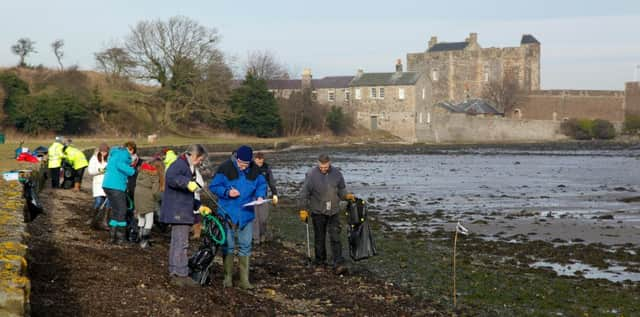Scottish beaches worst in UK for toilet-flushed trash


The amount of rubbish washing up on Scotland’s coastline has increased by nearly a sixth in the past year.
The nation has also retained its reputation as the UK’s worst for sewage-related debris.
Advertisement
Hide AdAdvertisement
Hide AdThe findings come from the latest UK-wide annual beach clean by the Marine Conservation Society.
Litter weighing as much as an adult giraffe was collected from shores north of the border during the nationwide Great British Beach Clean.
Volunteers picked up a total of 2,503kg of man-made detritus as part of the operation, with an average of 559 items found on each 100m stretch of ground surveyed.
This included an average of 16 glass and plastic bottles and drinks cans.
The most frequently found items were tiny pieces of plastic and polystyrene, as well as plastic bags, caps and lids and nappies, cotton buds, wet wipes and other waste wrongly flushed down toilets.
Overall litter levels on Scottish beaches rose by 14 per cent from 490 per 100m of coastline in 2017, but remained lower than the UK average of 600.
Record numbers of helpers took part in the latest beach clean, according to the Marine Conservation Society (MCS), which has been running the initiative for the past 25 years.
More than 2,900 Scots got involved – almost twice as many as last year.
Advertisement
Hide AdAdvertisement
Hide AdCatherine Gemmell, Scotland conservation officer for MCS, said support from members of the public had been overwhelming and highlights a major shift in attitudes towards beach litter.
“I am always in awe of the incredible people who give up their precious time to help us clean and gather important data on our beaches,” she said.
“Finally, beach-cleaning is mainstream, and at MCS we couldn’t be happier – it’s what we’ve been working towards over the last 25 years.”
The latest findings are further evidence that deposit-return systems due to be brought in across Scotland and the UK are urgently needed, according to the charity.
Ms Gemmell said sewage-related debris also remains a major problem.
The number of cotton buds found on Scottish beaches rose from 29 per 100m to 36.
“That’s the second highest number found during the last decade and double the amount compared to the rest of the UK,” she said.
Plastic-stemmed cotton buds have consistently been in the top 10 rubbish items found on UK beaches over the last 25 years.
Advertisement
Hide AdAdvertisement
Hide AdEarlier this year the Scottish Government announced a ban on their sale and manufacture.
Ms Gemmell added: “Alongside the fact that most major retailers have switched to paper-stemmed sticks, we should start to see a drop in the number of plastic cotton bud sticks we find.
“But, as with all things plastic, their legacy will last for decades.”